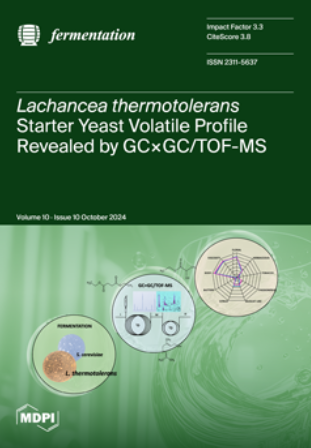Changes in the Concentration of Amino Acids and Bacterial Community in the Rumen When Feeding Artemisia absinthium and Cobalt Chloride
IF 3.3
3区 农林科学
Q2 BIOTECHNOLOGY & APPLIED MICROBIOLOGY
引用次数: 0
Abstract
The aim of the study was to analyze the effect of a plant feed additive based on Artemisia absinthium and the metal trace element CoCl2 (cobalt chloride II) on the metabolism of amino acids closely related to the energy of feed and the bacterial community of the rumen of Kazakh white-headed bulls. Animals were divided into four groups: (A)—the control group of animals received the basic diet (BD), (B)—animals of the experimental group I were additionally given A. absinthium at a dose of 2.0 g/kg of dry matter (DM), (C)—II experimental group A. absinthium at a dose of 2.0 g/kg DM with additional CoCl2 (1.5 mg/kg/DM), and (D)—III experimental group was given only CoCl2 (1.5 mg/kg/DM) to study the rumen metabolism of amino acids and bacterial diversity of animals, rumen cannula were installed, the experiment was carried out using a 4 × 4 Latin square. It was found that additional feeding of A. absinthium, both separately and in combination with CoCl2, led to a change in the indices of the alpha biodiversity of the bacterial community. Correlation analysis revealed a linear relationship between the concentration of amino acids and the rumen bacterial community (p ≤ 0.05). The relationship between the values of amino acid concentrations and certain OTUs was established, with a possible percentile probability of 95% for the genera unclassified Lachnospiraceae, unclassified Clostridiales, unclassified Bacteroidales, Fibrobacter, Ihubacter, Phocaeicola, Paludibacter, Akkermansia, Vampirovibrio, unclassified Ruminococcaceae, and Alistipes. Thus, the use of A. absinthium and CoCl2 as feed additives, both in combination and without, leads to a change in the taxonomic structure affecting the concentration of amino acids. However, further research is needed to better understand the effectiveness and safety of these supplements.饲喂苦艾草和氯化钴对瘤胃氨基酸浓度和细菌群落的影响
本研究的目的是分析以苦艾和金属微量元素CoCl2(氯化钴II)为基础的植物饲料添加剂对哈萨克斯坦白头牛瘤胃中与饲料能量和细菌群落密切相关的氨基酸代谢的影响。将动物分为四组:(A)-接受基础饮食(BD)的对照组动物,(B)-实验组I的动物额外给予2.0 g/kg干物质(DM)剂量的苦艾,(C)-II实验组A.苦艾,2.0 g/kg DM剂量,(D)--III实验组仅给予CoCl2(1.5mg/kg/DM),以研究动物瘤胃氨基酸代谢和细菌多样性,安装瘤胃插管,用4×4拉丁方进行实验。研究发现,单独或与CoCl2联合喂食苦艾,会导致细菌群落α生物多样性指数的变化。相关分析显示,氨基酸浓度与瘤胃细菌群落之间存在线性关系(p≤0.05)。氨基酸浓度值与某些OTU之间的关系已经建立,未分类的钩吻螺科、未分类的梭状芽孢杆菌属、拟杆菌属、纤维杆菌属,Ihubacter、Phocaeicola、Paludibacter、Akkermansia、Vampirovibrio、未分类瘤胃球菌科和Alistipes。因此,将A.absinthium和CoCl2用作饲料添加剂,无论是组合使用还是不使用,都会导致影响氨基酸浓度的分类结构的变化。然而,还需要进一步的研究来更好地了解这些补充剂的有效性和安全性。
本文章由计算机程序翻译,如有差异,请以英文原文为准。
求助全文
约1分钟内获得全文
求助全文
来源期刊

Fermentation-Basel
BIOTECHNOLOGY & APPLIED MICROBIOLOGY-
CiteScore
3.80
自引率
18.90%
发文量
594
审稿时长
7 weeks
期刊介绍:
Fermentation-Basel is an international open access journal published by MDPI, focusing on fermentation-related research, including new and emerging products, processes and technologies, such as biopharmaceuticals and biotech drugs. The journal enjoys a good reputation in the academic community and provides a high-impact forum for researchers in the field of bioengineering and applied microbiology.
 求助内容:
求助内容: 应助结果提醒方式:
应助结果提醒方式:


